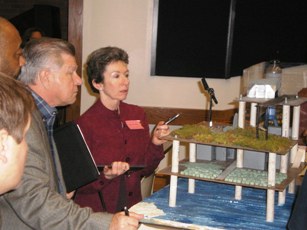Judging
Help!
We need dozens and dozens of judges to score team deliverables for the Future City Competition. As a judge, you will draw on your expertise and resources to fairly assess the team’s efforts.
Elementary and Middle-school student teams begin in September with their Future City designs and finish in January with the presentation of those designs. The deliverables include:
- Technical Essay on an assigned engineering topic in December,
- Project Plan with reflections on program results in January
- 3D Scale Model in January
- Oral Presentation and Q&A in January
For the Future City Junior elementary school program, the teams will be delivering a Technical Essay in December and a 3D Scale Model in January.
This year (2022-23), after 2 years of virtual competitions, only the Essay and Project Plan will be judged online, on your own schedule. The Model, Presentation and Q&A judging will be on-site and in-person, allowing judges the opportunity to interact with the student teams.
Sign up for one or more than one - you determine your level of commitment. Note - there are separate sign-ups for each competition
- Future City Competition (middle school)
- Future City Junior (elementary school)
Judging Opportunities
City Essay (Future City Competition & FC Junior)
Scoring student research papers (max 1500 words). Research topics - solving a critical engineering problem - are assigned annually.
- Need about 20 volunteers (FCC) and 8 volunteers (FC Jr).
- Judging online, on your schedule, at your computer.
- Approximate commitment: 5 hours, Dec-Jan.
Model, Team Presention, and Q&A (Future City Competition)
Rating overall city design, physical models, and team presentations.
- Need about 40 volunteers (Future City Competition)
- Judging on-site at Regional Event.
- Interacting with student teams, Q&A.
- Approximate commitment: 5 hours, Jan.
Model (FC Junior)
Rating overall city design, solution to theme challenge, and physical models.
- Need about 10 volunteers
- On-site, at Regional Event.
- Interacting with student teams, Q&A.
- Approximate commitment: 4 hours, Jan.
Special Awards (Future City Competition & FC Junior)
Judging for specific, sponsored category awards (e.g., Transportation system design, Sustainability, Urban design, Civil infrastructure).
- Need about 20 volunteers. Generally representatives from award-sponsoring organizations.
- On-site, at Regional Event.
- Interacting with student teams, Q&A.
- Approximate commitment: 8 hours, Jan.
| Sign Up Now - there are separate sign-ups for each competition |
| Future City Competition (middle school) |
| Future City Junior (elementary school) |
About Judging
While Future City is primarily an educational program for elementary and middle school students, it is also a - as the title says - a "competition." And, our goal is to make it as fair and unbiased as possible.
First, each deliverable is scored by at least three judges and those scores averaged for a single component score. A composite score for each team is calculated by adding the component scores for each deliverable.
Next, we have detailed rubrics for each deliverable to assist the judges in scoring. The rubrics have been developed to help ensure consistent scoring from judge to judge and from region to region. However, we recognize that the criteria cannot cover all possible situations. Judges need to examine the specific elements of each entry and determine a score that is consistent with the rubric and accurately reflects the quality of the team’s effort.
Also, we provide instructions and training materials for many of the judging tasks.
- Score sheets, rubrics, and judging instructions for the online deliverables are accessible from the Future City and FC Junior judging centers.
- For on-site judging (Model, Presentation and Special Awards), we will hold an orientation session and provide you with rubrics, score sheets, sample questions, etc.
- Model, Presentation and Special Award judges also have access to the online judging center prior to the event to review Essays and become familiar with the entries.
Finally, the top 4-6 teams will advance to the finals where they will compete head-to-head in front of a single panel of judges.
Please keep in mind, as you evaluate the teams' entries
- These young students (4-5th and 6th-8th grades) have been working long and hard on their designs.
- Each judge-volunteer is part of a judging panel. Scores will be averaged.
- Scores for each deliverable make up only a portion of the total score.
- All judges may go online after the competition to see final scores for the teams.


